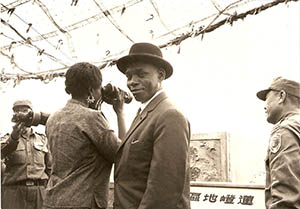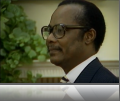Stéphane Maurice Bongho-Nouarra was a Congolese politician. He served in the government of Congo-Brazzaville during the late 1960s, and after a long period in exile, he returned and played an important role in the politics of the 1990s. Bongho-Nouarra was briefly Prime Minister of Congo-Brazzaville from September 1992 to December 1992.

Pierre Nzé is a Congolese politician and diplomat. During the single-party rule of the Congolese Labour Party (PCT), he held leading positions in the government and party. Later, he was Minister of State for Justice from 1997 to 1999, and he served in the Senate of the Republic of the Congo from 2002 to 2011.
Jean-Michel Bokamba-Yangouma is a Congolese politician. He was a prominent political figure from the 1970s to the 1990s, heading the Congolese Trade Union Confederation. He is currently the President of the General Movement for the Construction of Congo, a political party.
Claude-Ernest Ndalla is a Congolese politician. First coming to prominence as a radical youth leader in 1960s Congo-Brazzaville, he was one of the leading members of the Congolese Labour Party (PCT) in the period immediately following its founding in 1969, but after a few years his career fell into a long decline due to factional struggles within the PCT. Later, he served in the government of Congo-Brazzaville as Minister of Youth Redeployment and Sports from 1997 to 1999, and he has been a Special Adviser to President Denis Sassou Nguesso since 2003.
The Congolese Youth Union was a youth organization in Congo-Brazzaville. The U.J.C. was initially merely a local branch of the Republican Youth Union of France (U.J.R.F.), the youth wing the French Communist Party. However it developed into an independent organization and began organizing cells in different parts of the territory. The movement established a sizeable presence in the cities of lower Congo, such as Point-Noire, Jacob and Dolisie. U.J.C. was led by the trade union leader Aimé Matsika.
The Trois Glorieuses was an uprising in Congo-Brazzaville which occurred from August 13 to 15, 1963. The uprising ended the rule of the first Congolese President, Fulbert Youlou, as the opposition trade union movement and Congolese Youth Union struck an alliance with the army.
The Congolese Progressive Party was a political party in Congo-Brazzaville. It was the first Congolese political party, and the Congolese section of the African Democratic Rally (RDA). Until 1950 PPC was closely connected to the French Communist Party. The party was largely based amongst the Vili people. Aubert-Lucien Lounda was the General Secretary of the party.
The first elections to the Representative Council of Moyen-Congo were held between December 1946 and January 1947. A government decree, issued on 26 October 1946, had called for the holding of elections for Representative Councils in each of the territories of French Equatorial Africa.
Elections to the French National Assembly were held in Gabon and Moyen Congo as part of the wider French elections election on 10 November 1946.
Comité de liaison de patronat de l'A.E.F. was an employers' organization in French Equatorial Africa (AEF). It had territorial branches in each of the four territories of AEF. COLPAEF was founded a few days after the introduction of the French Overseas Labour Code in 1953. The organization was affiliated to the Conseil national du patronat français (CNPF), the French National Employers Council. A Permanent Secretariat coordinated the activities of the four territorial branches of COLPAEF.

Emmanuel J. Damongo-Dadet was the first Congolese ambassador to the United States and the United Nations. He was born in Impfondo, at the time Congo was the Middle Congo, a colony that was ruled by France. In his early days, he was taught at Brazzaville and went on to become a teacher and director of École Urbaine at Dolisie. A renowned journalist, poet and novelist in his native country, he wrote Congolila which was published in 1950 and Panorama Congolais in 1962.
Gilbert Youlou Mabiala, popularly known as Prince Youlou, is a Congo music recording artist, composer and vocalist, in the Republic of the Congo (Congo-Brazzaville). He was once a member of the Congo Music band TPOK Jazz which dominated the Congolese music scene from the 1960s through the 1980s.

Municipal elections were held for the first time in Moyen-Congo on 18 November 1956. Voting took place in three municipalities; Brazzaville, Pointe-Noire and Dolisie. The Democratic Union for the Defence of African Interests won the polls in all three municipalities. Fulbert Youlou became mayor of Brazzaville.
André Kerhervé was a French politician, active in Congo-Brazzaville. Kerhervé managed a printing business. Politically, he labelled himself an Independent. He was heading the UDSR in Moyen-Congo. In 1957 he was elected to the Territorial Assembly as an African Socialist Movement (MSA) candidate. On December 8, 1958 he was named Minister of Industrial Production in the government of Fulbert Youlou.
Between June 5 and 6, 1963, the Guinean president Sékou Touré made an official visit to Brazzaville, the capital of the Republic of the Congo. He was received by the Congolese president Fulbert Youlou. The visit sparked protests against the Congolese government, marking a beginning to the popular movement that would end Youlou's rule two months later.
Léon Angor was a Congolese politician and trade union leader. He was a leader of the CASL trade union centre. He was the president of the National Assembly of the Republic of the Congo between 1964 and 1966. Angor was identified as part of the pro-China wing of the ruling National Movement of the Revolution. Under Angor's aegis, the Congolese Trade Union Confederation was formed in March 1964.
René Malbrant was a French veterinarian and politician. He served as a member of the French National Assembly between 1946 and 1959.

The Nigerien Action Bloc was a political party in Niger in 1955 and 1956 led by Issoufou Saïdou Djermakoye, a traditional chief and former chairman of the Nigerien Progressive Party (PPN).

Stanislas Batchi Boussandji was a politician and the Congolese ambassador to the United States and the United Nations from June 5, 1985 to December 21, 1987.






